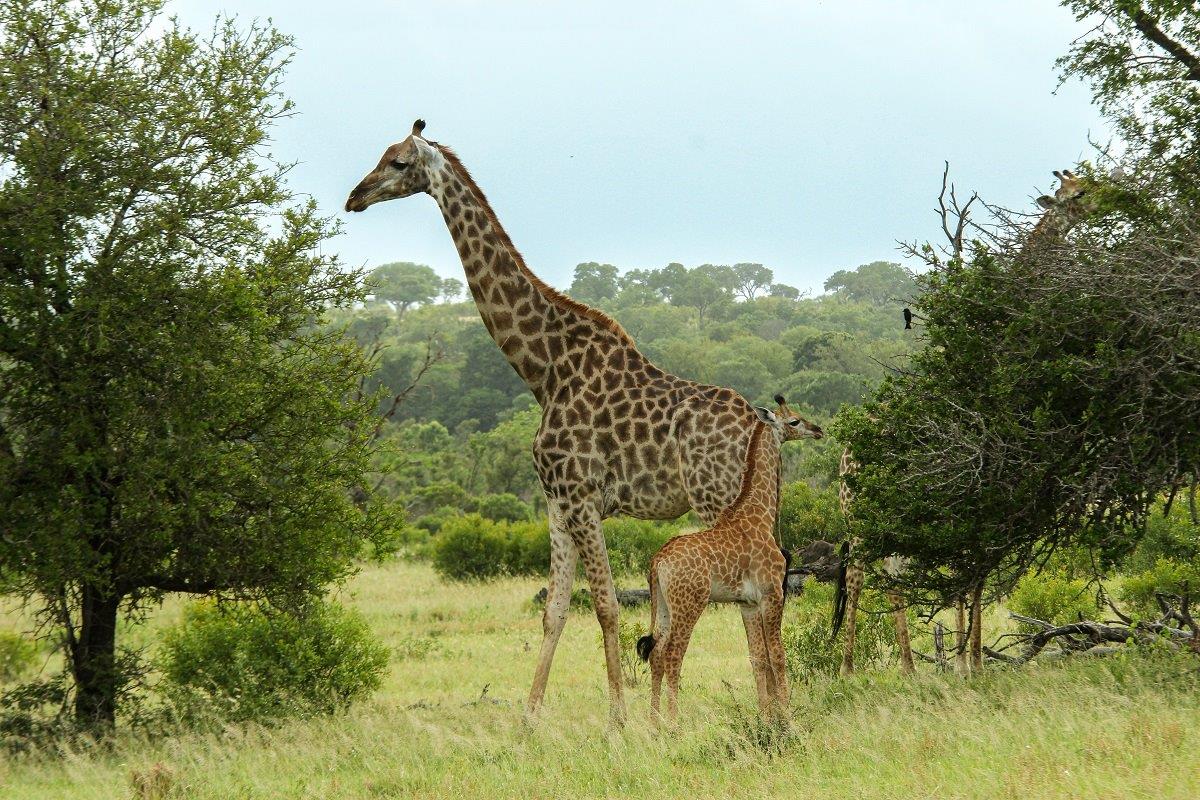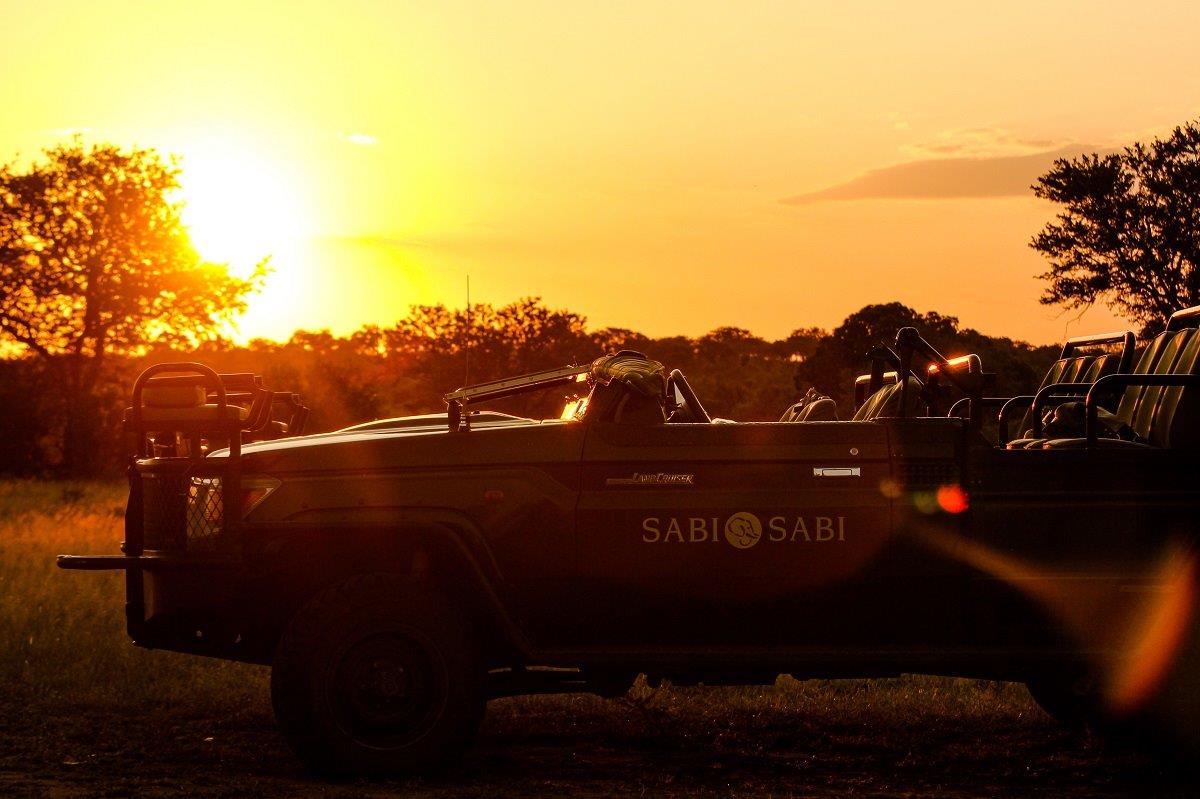A Week in the Bush Vol. 447
on Feb 15, 2023It has been an extremely wet week in the bush with huge amounts of rain falling! As a result of this, safaris have been restricted to roads only as to not damage the vegetation around us. We have still been very lucky with sightings despite needing to exercise patience and wait for the animals to come to us… Herewith a recap from a challenging time in the bush…
The stillness before the storm. We watched this elephant bull moving with pace as he surely knew what was about to come. With the floods, animals have been seen moving to higher ground to avoid being captured by the force of nature.

On a very rainy and cloudy day we set out hoping to not get caught in a downpour. Despite the damp conditions, we remained positive that we would have some good sightings before the storm hit.
We were heading over one of the big open areas and saw a huge number of vultures hanging around in some of the dead trees and knew that there had to be something below. We made our way over and heard the faint growl of a lion and as we came around one of the bushes, we saw that there were three male lions feeding on what was left of a small buffalo! What a find!!


After lions had killed a buffalo, these White-backed Vultures stayed close by in the hopes that they will get some of the remains of the carcass when the lions leave, and before the hyenas move in.
Vultures are extremely important in the bush, and like we always say, they are like the clean-up crew of the bush. They get rid of any dead material, and by doing that, also get rid of any diseases.

The Styx Pride has been around the eastern part of reserve for a while and we were lucky one morning to find them less than a kilometre from Selati Camp, we spotted the pride in the distance, but they were far from the road. We waited for quite some time before they came out and walked straight towards our vehicle! What a lucky sighting; our patience was rewarded!
Being summer, it is our rainy season meaning the grass is long and sometimes visibility is limited in certain areas. This is an advantage for predators when they hunt as they have a lot of cover to allow them to stalk their prey and get closer. The Styx Pride tried their luck on some impalas but failed as the young lionesses did not have the patience to wait for the right time to attack. A hard lesson learnt.




We found the N’weti male leopard close to the road as he was trying to stalk some impala grazing nearby. With the rain falling, he was trying to get as close as possible, undetected; but the impalas were also aware of their surroundings. As he gave up the hunt, we had a good opportunity to have a good view of him as he went up a termite mound to get a little elevation and be able to scan around the area.






Staying close to mother is vital as there are many dangers in the savannas. Giraffe babies nurse from their mothers for 9 to 12 months. Males will stay with the mother for up to 15 months before leaving to find his own group.

Kudu are usually very secretive and spend most of their time browsing in thick vegetation. On this occasion we were able to quietly roll close by to where an adult kudu cow was browsing.
Kudu are well adapted to surviving in the thick vegetation they live in. In the Greater Kruger National Park, kudu are known to feed off at least 148 different plant species, including some that are toxic to other herbivores.

As the year progresses, the impala lambs are learning how to survive in this dangerous world. Understanding that being together is vital for their survival, they need to work together to ensure they make it through the day as there are many eyes on them especially at night. Not only do they watch each other's back but they allogroom each other to ensure that they are clean from ticks and other parasites which can also kill them.

Barely reaching moms back, this zebra foal was very shy, but very curious of us stopping to view them. When born, zebra foals’ legs are almost as long as those of an adult zebra, and they can start walking after 20 minutes and running after one hour! This is extremely important as zebras are always on the move to find food and water, and the mom and new baby must keep up with the rest of the herd.

It was very interesting to watch this Woodland Kingfisher as it caught a frog and came to perch right in front of us. Joyfully calling as it has been victorious once more.

Hippos are highly territorial animals, and this big male did not hesitate to let us know that this is his dam. He tossed and turned in the water and showed off his massive teeth, all signs of him marking his territory.
Old male hippos in a small dam like this will not tolerate any other hippos to enter his dam. He won't even hesitate to chase any other animals off coming to drink water.

We found a big herd of elephants after some showers of rain. This one bull got our attention as he found a mud wallow with fresh water and was splashing the water and mud all over his body. With a brief bit of sunshine, this was truly a memorable and picture-perfect sighting!


Until next time

Blog by Wendy Claase
Images by Coenraad Stapelberg, Daniel Greyvenstein, Dieter Lategan, Jason Street and Ronald Mutero







